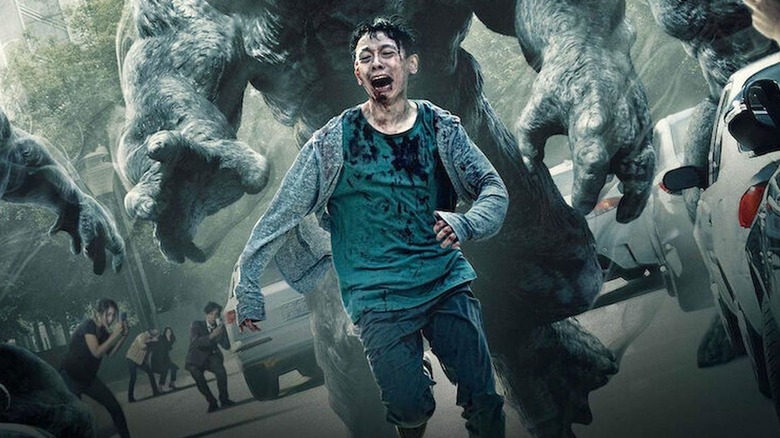
Voltaire's description of dying, offered to Louis Nicolas Le Tonnelier de Breteuil, baron de Preuilly in 1723, goes like this: "[I] made my confession; and my will, which ... was exceedingly short. After that, I calmly awaited death: only regretting ... that I must part from my friends so soon." Voltaire, of course, was a philosopher who wrote on behalf of the French Enlightenment, a movement that favored human happiness. To its members, knowledge wasn't merely power. It could be peace or joy, as well.
In "Hellbound," the knowledge that God exists does not grant enlightenment, peace, or joy. Rather, because it comes from grey, hulking monsters who descend on Earth to drag living miscreants to Hell, it brings madness. And what winds up being even scarier than the monsters in Yeon Sang-Ho's excellent Netflix series are the cult leaders, fringe groups, and general opportunists who seize power when the laws of nature feel so fragile.
A terrifying cast of characters is just one reason why "Hellbound" is a smash hit in the United States. The others include director Yeon Sang-Ho, the sudden boom of great Korean genre fare, and the show's own incisive examinations of morality, guilt, and judgement. Given that, here are 11 movies and shows to watch after you've finished "Hellbound" on Netflix.
Train To Busan
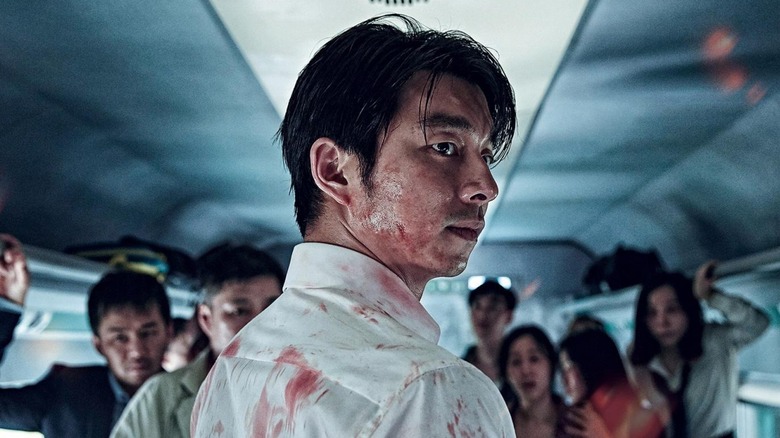
If Korean auteurs are to be believed, the world ends not with a bang, but a train whistle. In Bong Joon-Ho's "Snowpiercer" (and its subsequent TV remake), the last remnants of humanity ride a train that travels around the world; in "Hellbound" director Yeon Sang-Ho's "Train to Busan," a father, his estranged daughter, and countless others become trapped on a high-speed railway during a zombie outbreak in Korea. But where Joon-Ho's film utilizes railway transportation to eviscerate centuries-old classism, "Train to Busan" at first seems content to bombard you with things that are fast and scary, and leave it at that.
But there's actually more to it. Much more. Just as "Hellbound" is concerned with what makes life worth living, "Train to Busan" celebrates what makes humans noble. It's no accident that no one survives "Train to Busan" without the sacrifices of others; it's purposeful that panic makes monsters of the movie's characters, living or otherwise. It's the dichotomies between immolation and indebtedness, disgrace and dignity that remind audiences why the train is such a powerful setting for Sang-Ho's film.
As anyone who's ever ridden the rails can tell you, a long journey by train reminds you that we, passengers of life, are all in this together, right until the moment we aren't. That's a shared thesis of "Hellbound" and "Train to Busan," and if you've seen the former but not the latter, now is a wonderful time to amend that.
Train To Busan Presents: Peninsula

If "Train to Busan" clarifies the themes of Yeon Sang-Ho's "Hellbound," "Train To Busan Presents: Peninsula" exists to confuse them. Simply put, "Peninsula" is a swing and miss. It's overly reliant on beats from better-known zombie films ("28 Weeks Later," "World War Z," etc.) and more subservient to dodgy CGI than its 2016 predecessor. Why, then, am I recommending it?
Because strikeouts can be wonderful. There's magic in seeing effort realized by an artist who knows what they're doing, even when the end result isn't home-run worthy. Watching Sang-Ho become a more confident director is something to behold, particularly when the attempted flexes of "Peninsula" inform the heavy lifting that "Hellbound" pulls off easily. This film is, like many at-bats, a stepping stone to bigger and better things. If you want to understand why "Hellbound" succeeds, "Peninsula" is necessary and rewarding homework.
Squid Game
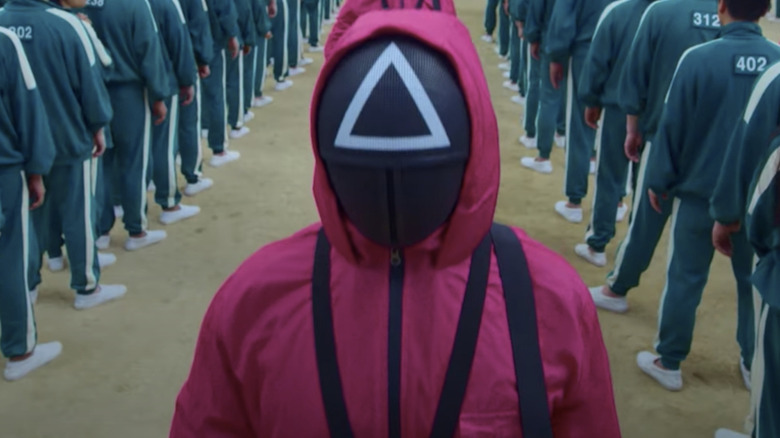
The reaction to Netflix's "Squid Game" has proven why our culture needed "Squid Game," and why we will continue to need shows like "Squid Game." A "Squid Game" Funko Pop is missing the point of "Squid Game." Chrissy Tiegan, a professional rich person, wildly missed the point of "Squid Game." I'm not going to explain that point here because, if there's even the slightest chance you haven't seen it, spoilers for Hwang Dong-hyuk's Netflix hit are an act of cruelty on par with some of the many indecencies inflicted on the show's characters.
So, why should you watch "Squid Game," particularly if you've seen "Hellbound"? Because, if "Hellbound" looks at how power structures unravel and reform when the supernatural yank on their threads, "Squid Game" is a history of how those institutions are seized and maintained by humans in flesh-and-blood society.
Tellingly, in both series, bloodcurdling violence is a through line. It's not gratuitous in either show, nor is it cool or in any way appealing. It's a tactic employed by the show's characters and captured by the show itself. Violence -- who receives it, how they do so, and how both of those are dulled -- is part of the point that both "Squid Game" and "Hellbound" strive to make. If you're watching closely, it's unmissable.
Thirst
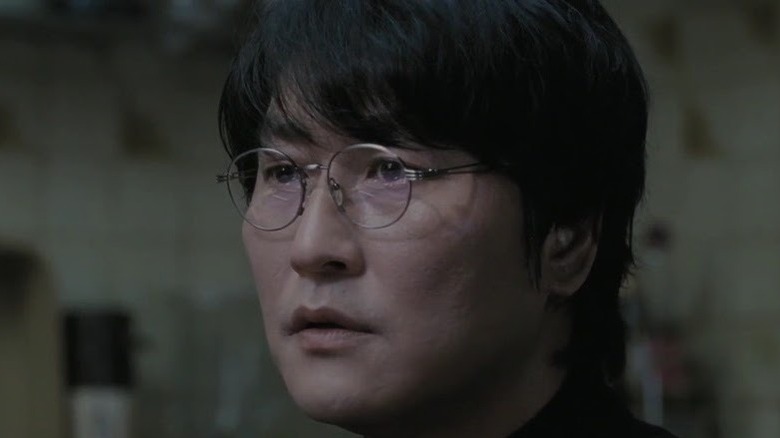
"Hellbound" isn't the first Korean work to ask tough questions about faith, religion, and the violence underlying both. I'm not sure that distinction belongs to "Thirst," either, but Park Chan-wook's dazzlingly erotic vampire film reached the States before most, netting a healthy $13 million at the worldwide box office and introducing many to the great Kang Hong-so, who plays the Roman Catholic priest Sang-hyun and would later breakout with "Parasite." It's a film that, like its medically affected protagonists, has barely aged a day since its release. It rips.
The ways in which it rips, however, make it a fascinating companion piece to "Hellbound." At the risk of deploying mild spoilers, the catalyst for Sang-hyun's transformation to vampirism is an act of sacrifice. He volunteers for a medical procedure because he believes that is how a good life is led. He is not responsible for the blood transfusion that saves him and renders him instantly prone to vampirism, despite his best efforts to resist.
How would the obelisks of "Hellbound" find Sang-hyun? At which point on his journey would he still be bound for Heaven? It's a question that "Thirst" doesn't successfully answer, but one that lingers throughout its run time and long after the credits roll. I personally imagine it's one that Yeon Sang-Ho asked himself, if he happened to see "Thirst" before making "Hellbound." If you check out "Thirst" for yourself, the question will happily haunt you, as well.
Gonjiam: Haunted Asylum
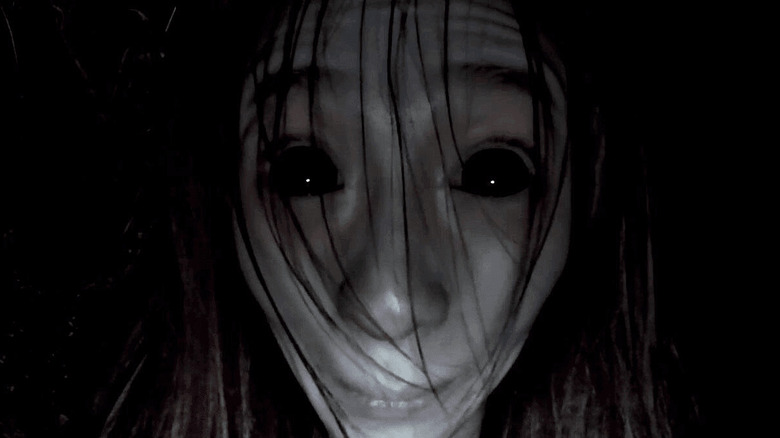
Speaking of haunted, few films in any genre, from any country, can compare with the lingering terror conjured up by "Gonjiam: Haunted Asylum." Anyone who still believes the found footage horror film can't be scary should be offered a copy of "Gonjiam," dared to watch it, and videotaped as they do. Should they make it through without assuming the fetal position on more than one occasion, they're a stronger person than I am.
Don't watch "Gonjiam: Haunted Asylum" because you enjoyed the philosophical quandaries raised by "Hellbound. Do it because its dock sequence is expertly nerve-racking. Do it because Yoo Ah-in's performance as Jung Jin-su got under your skin, stayed there, and you liked it. If you're craving additional horror from Korea, "Gonjiam" is the answer. It is, for my money, the white-hot sun the country's genre output has circled since its release. For people who like being creeped out, it's absolutely unmissable.
The Medium
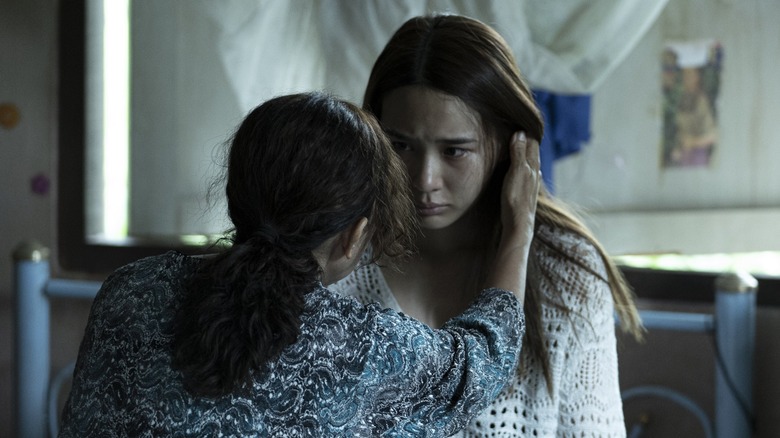
The previously mentioned Jung Jin-su -- cult leader, true believer, and evangelist of angel beatdowns -- is one of the most compelling characters in "Hellbound." An enigma right up until the season's final moments, his decree that a woman be beaten on television for all to see is undeniably savage, but it's also frighteningly understandable. These creatures have already been seen by thousands. Their continued exposure to the public lets them be the change Jin-su wants to see in the world. They're impossible to wipe from your mind.
In some ways, Banjong Pisanthanakun's "The Medium," a Shudder exclusive from Thailand that premiered on the service in 2021, has the same thrust. It's shot in a mockumentary style, and follows Nim, a woman who claims to be possessed by the spirit of Bayan, a deity that the locals around her worship. The film crew comes to document Nim and her healing powers. The project, of course, goes off the rails almost immediately.
"The Medium" is ultimately more of a slow-burn than "Hellbound," but its interrogation of what faith yields is strikingly similar. Without spoiling the film's ending, Nim's sister, who converted to Christianity to avoid being Bayan's shaman, plays a pivotal role in the proceedings, as does her religion. And did I mention the film was created by the team behind "The Wailing"? That, as well as its stirring examination of who truly speaks for divinity, are reasons to stream "The Medium" as soon as possible.
The Leftovers
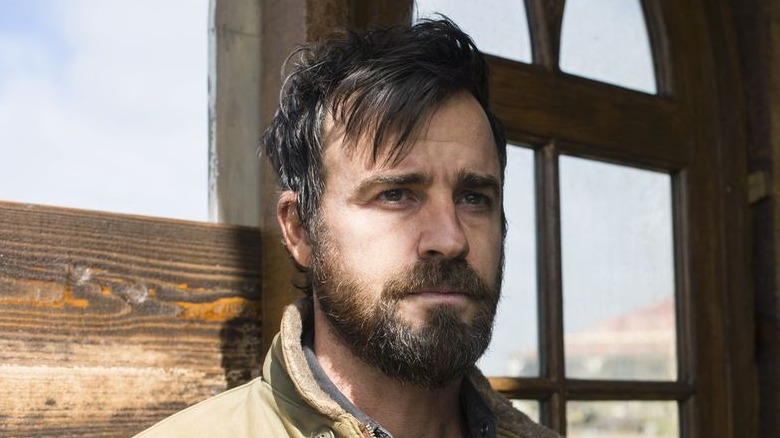
There are few American equivalents to "Hellbound." That's part of what makes it refreshing. The frankness of its violence and its charged conversation about spirituality can make viewers uneasy; that sort of terrain is often softened for U.S. audiences. It is not, however, in "The Leftovers." HBO's 2014 drama has quietly appreciated in value over the years, thanks in no small part to both a finale that stuck an incredibly difficult landing and also a devoted Twitter following. Anyone who watches "The Leftovers" front to back wholeheartedly agrees that it owns.
What's fascinating about "The Leftovers" when compared with "Hellbound" is how different their paths to the screen were, and how that reflects on both thematically. "Hellbound" was delivered to Netflix fully formed, instantly awaiting judgement from both the network and audiences. "The Leftovers," by contrast, improved itself over time, even when it faced the ax from its own creator.
Fittingly, in "Hellbound," the ticking clock for the angels' targets starts the minute judgement is passed. By contest, in "The Leftovers," characters have chances to change their ways on Earth. Taken as a tandem, "The Leftovers" and "Hellbound" offer alternate takes on what might happen in the wake of a divine verdict, while simultaneously probing the reasons why that kind of judgement makes us feel uneasy in the first place. They're both worth seeing.
Constantine
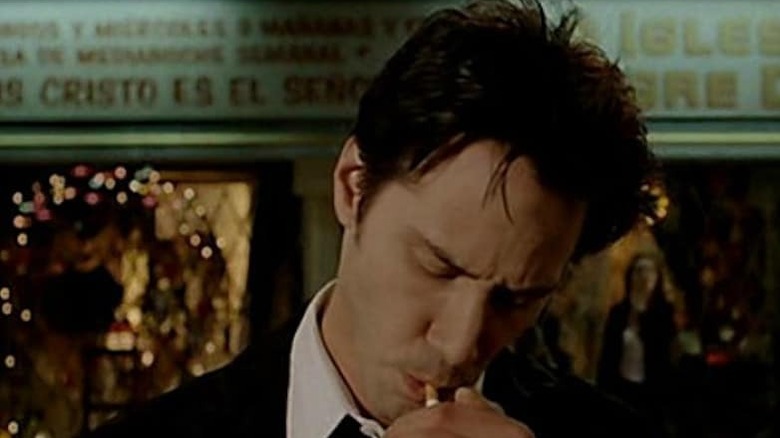
If "The Leftovers" is a thoughtful meditation on the nature of Heaven and Hell, Francis Lawrence's "Constantine" is a film that does some whiskey shots in both and lets the good times roll on through. Released before the superhero movie boom that Marvel catalyzed, this DC Comics adaptation was promptly deemed a bomb by critics, but, as with John Constantine generally, rumors of its demise were greatly exaggerated. "Constantine" endures on both film Twitter and HBO Max for a variety of devilish reasons.
For one, like "Hellbound," "Constantine" takes care in the realization of its visuals. Naturalistically shot urban environments give way to surreal and threatening interiors, and the creature effects are otherworldly yet feel bizarrely organic. Additionally, as in "Hellbound," the cast delivers in spades. John Constantine is a peak Keanu Reeves role, one that marries his predilection for simmering anger to some wry dialogue he can channel it through. Rachel Weisz is reliably great. Tilda Swinton plays the angel Gabriel; that casting sells itself.
More than anything, though, "Constantine" is a crowd-pleasing counterpoint to "Hellbound," offering an action-packed chaser to the Netflix series' labored, slow-burn horror. It reminds you why you enjoy watching shows like this in the first place, and that makes it a fine post-"Hellbound" treat.
Carnivale
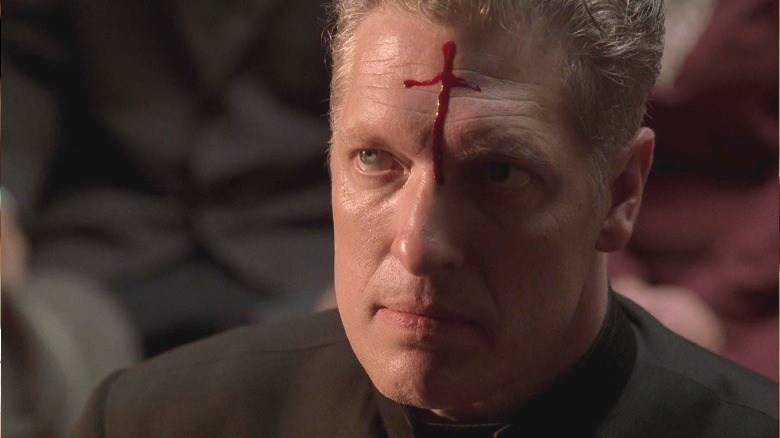
HBO's "Carnivale," which first released in 2003, is hardly a show we think of as groundbreaking. At the time, its general weirdness felt indebted to David Lynch and "Twin Peaks," and its tale of a traveling carnival beset by the forces of good and evil (possibly Heaven and Hell) never got the satisfying wrap-up it deserved, making it a deeply frustrating rewatch. That said, there's zero question that "Carnivale" laid fruitful ground from which "Hellbound" could bloom, most notably in the character of Brother Justin.
Brother Justin (played by the always tremendous Clancy Brown) is a Methodist minister who establishes a church in God's name following the discovery of his own supernatural abilities. Like the cult leaders of "Hellbound," Justin feels divinely elevated by his chosen Lord and Savior, an instrument as much as man. However, when that all comes crashing down around him, the consequences are tremendous. It's an arc entirely worth seeing — one enhanced by settings, yes, but a;so one that might anticipate where "Hellbound" is headed. In that sense, "Carnivale" might still be breaking ground.
Yellowjackets
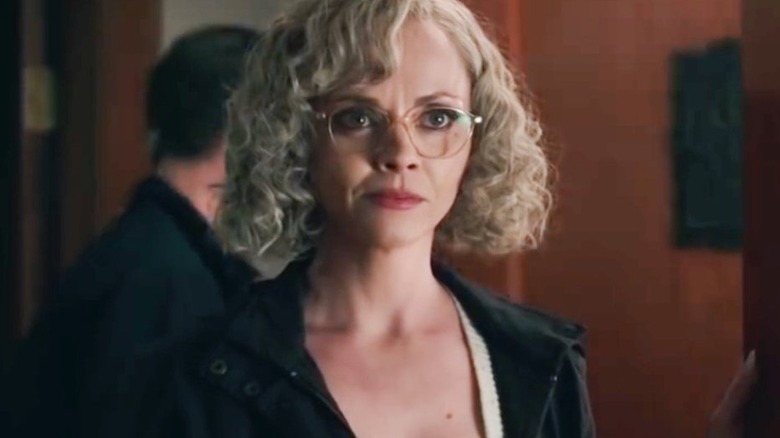
Two episodes into its run and I'm looking for any excuse to recommend Showtime's "Yellowjackets" to anyone. Best described as "Lord of the Flies" by way of both "Lost" and peak Margaret Atwood, this show, created by Ashley Lyle and Bert Nickerson, has an instantly classic pilot directed by Karyn Kusama ("The Invitation," "Destroyer") and a twisty, shocking story.
While it isn't clear yet how much common ground "Yellowjackets" will ultimately share with "Hellbound," if you enjoyed "Hellbound," you clearly have an affinity for genre television. You're willing to follow a story to dark places. You enjoy it when intelligent subtext meets viscera and blood. "Yellowjackets" has all this, and then some.
More than anything, "Yellowjackets" is, even early into its run, a story about the primal parts of ourselves that we withhold from ourselves. Sometimes that's society's fault. Other times, it's our beliefs'. "Yellowjackets" presents a scenario where all the colors of its characters' personalities come bleeding through to the surface, no matter the situation, place, or decade. It makes its protagonists face the selves they would be judged for if divine arbiters ever saw them. That makes it worthy of a watch, particularly as a "Hellbound" companion piece.
Dr. Brain
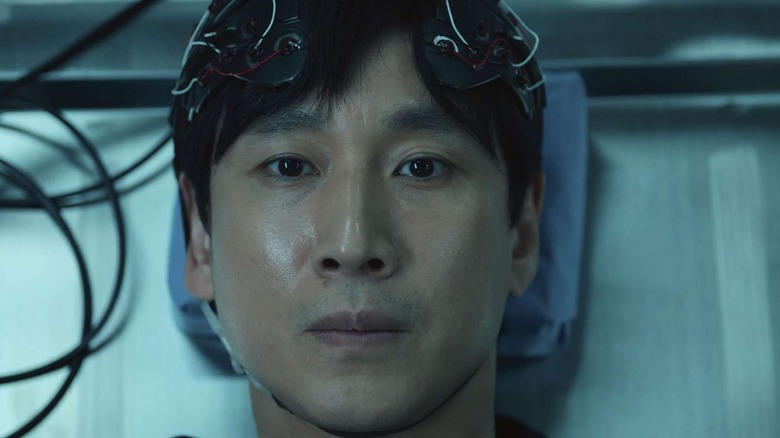
The deeper you dive into "Dr. Brain" the more it echoes "Hellbound." On its surface, "Dr. Brain" is a Korean drama that Apple is hoping will ride "Squid Game"-mania to glory. Beyond that, it's a long-form story written and directed by one of Korea's most important filmmakers. "Dr. Brain" is the brainchild, pun intended, of Kim Jee-woon, the talent behind "I Saw the Devil" and "A Tale of Two Sisters." Anything that stems from his mind is worth seeing.
But "Dr. Brain" and "Hellbound" also ask deep, difficult questions about the nature of human existence using both horror and family drama. Some of the most effective scenes in "Hellbound" involve Min Hyejin and her family dealing with the wake of the judgement passed on her. Similarly, "Dr. Brain" probes the way the joys and tragedies of those we hold close to us inform our evolution as people, for better and for worse. Without spoiling it, the losses in "Dr. Brain," as in "Hellbound," have society-shifting consequences. If you enjoyed the mounting dread of the latter, "Dr. Brain" is a program well worth diving into.
Read this next: The 15 Best Japanese Horror Movies Of All Time
The post Movies and Shows to Watch After You Finish Hellbound appeared first on /Film.
0 Commentaires